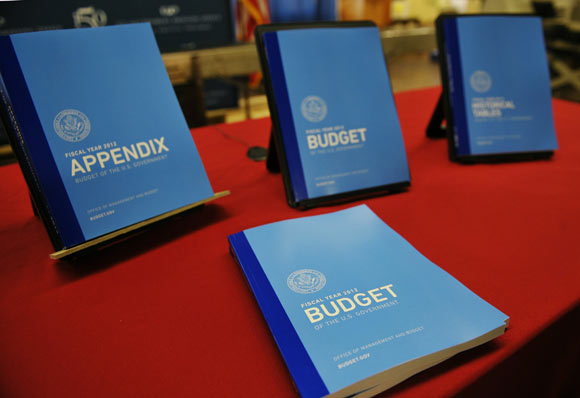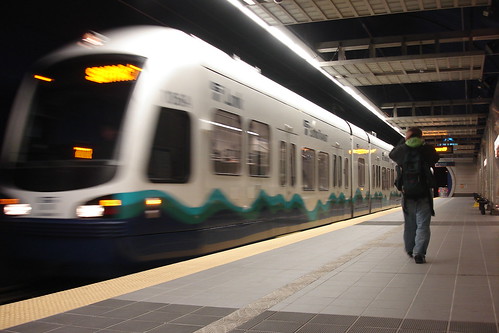FINAL UPDATE, 2/19/11, 9am: The House voted 235-189 in favor of an FY2011 budget containing $60 billion in spending cuts.
No Democrats supported the continuing resolution and three Republicans opposed it. The Hill has more here, and the final roll call vote is here.
ORIGINAL POST: The U.S House of Representatives is currently debating a bill to fund the government through September of this year. As we noted earlier in the week, the budget under consideration contains deep cuts to transportation, including many of travel options Americans use and support.
Some of the most important cuts to transportation contained in the initial language include:
- New Starts, the program that funds new transit construction, gets cut by $430 million. There is also a rescission of about $300 million in unspent 2010 (fiscal year) funds.
- High-speed rail is cut completely and the CR would rescind essentially all funds from 2010. Other than the money already spent, this entire program is eliminated.
- The innovative TIGER program is eliminated completely and the unspent/unobligated FY10 funds are rescinded.
- Amtrak appears to be mostly intact, avoiding the cuts that were proposed by the GOP study committee.
These cuts are the wrong direction for a fragile economy and high unemployment rate. And, as a recent report from Smart Growth America noted, spending on public transportation and infrastructure maintenance is one of the best job-creation tools around. Why would Congress put that at risk?
As if those cuts were not bad enough, several members offered amendments that would go even deeper. Some of the amendments include:
- Amendment No. 453, which would eliminate all funding for Amtrak. (Sponsor: Rep. Connie Mack, R- Florida)
- Amendment No. 45, which would reduce Amtrak funding by $447 million (Sponsor: Rep. Pete Sessions, R-Texas)
- Amendment No. 204, which would remove funding for the White House Director of Urban Affairs (Sponsor: Rep. Steve Scalise, R-Louisiana)
A number of amendments would restore critical programs. These include:
- Amendment No. 400, which would restore all Recovery Act funding (Sponsor: Rep. Sheila Jackson Lee, D-Texas)
- Amendment No. 69, which would restore funding to the TIFIA grant program (Sponsor: Rep. Jared Polis, D-Colorado)
- Amendment No. 44, which would restore most public transportation funding (Sponsor: Rep. Jerrold Nadler, D-New York)
An amendment sponsored by Northern Virginia Democrat Gerry Connolly that would have restored cuts to the Washington DC Metro system was ruled out of order by House Republicans and will not come up for a vote.
Congress is expected to continue debating for several hours, with a final vote time still unclear. Amendments relating to the Department of Transportation have not yet been considered.
UPDATE, 2/17/11, 9:30am: The House took up or postponed action on two amendments of interest late last night:
- Amendment No. 511 (Nadler), which would have restored funding to several transportation programs, was ruled as out of order for lack of a revenue source and will not come up for a vote.
- Amendment No. 43 (Sessions), which would reduce Amtrak funding by $447 million, was postponed and is expected to receive a vote today.
UPDATE, 11:15am: Amendment No. 43 (Sessions), which sought to reduce Amtrak funding by $447 million, was defeated by a vote of 176-250.
UPDATE, 3pm: The House still has a number of amendments to consider on the Transportation and Housing portions of the budget. Members will continue debating into the evening, with a late vote expected on the full package.
UPDATE, 7pm: Amendment No. 204 (Scalise), which seeks to remove funding for several positions, including the White House Director of Urban Affairs, was approved by a vote of 241-171.
The Hill has more information on this vote.
UPDATE, 2/18/11, 10am: The House adjourned past 1am last night without voting on the bill. Debate continues today.
UPDATE, 12:45pm: The House is debating the “Republican Study Committee” amendment, which would add an across-the-board 5.5 percent cut to the entire budget, with exemptions for defense and homeland security. The amendment would also reduce legislative budgets by 11 percent.
Republican Rep. Dan Lungren, a member of the Committee, is opposing the amendment, saying the cuts to Capitol Police and legislative staff are too deep. House Appropriations Chairman Hal Rogers, Republican of Kentucky, also opposes the amendment.
UPDATE, 3:30pm: The amendment seeking an across-the-board spending cut of 5.5 percent was rejected by a vote of 147-281.
The Hill has more information.





